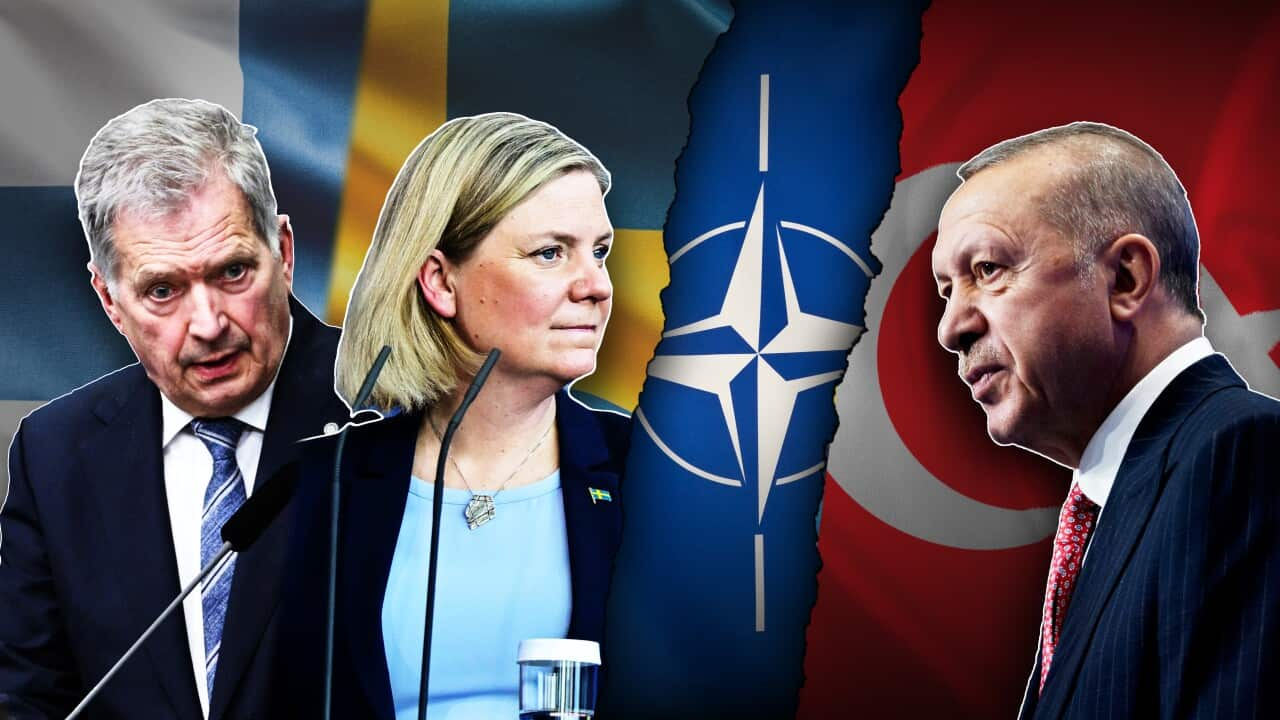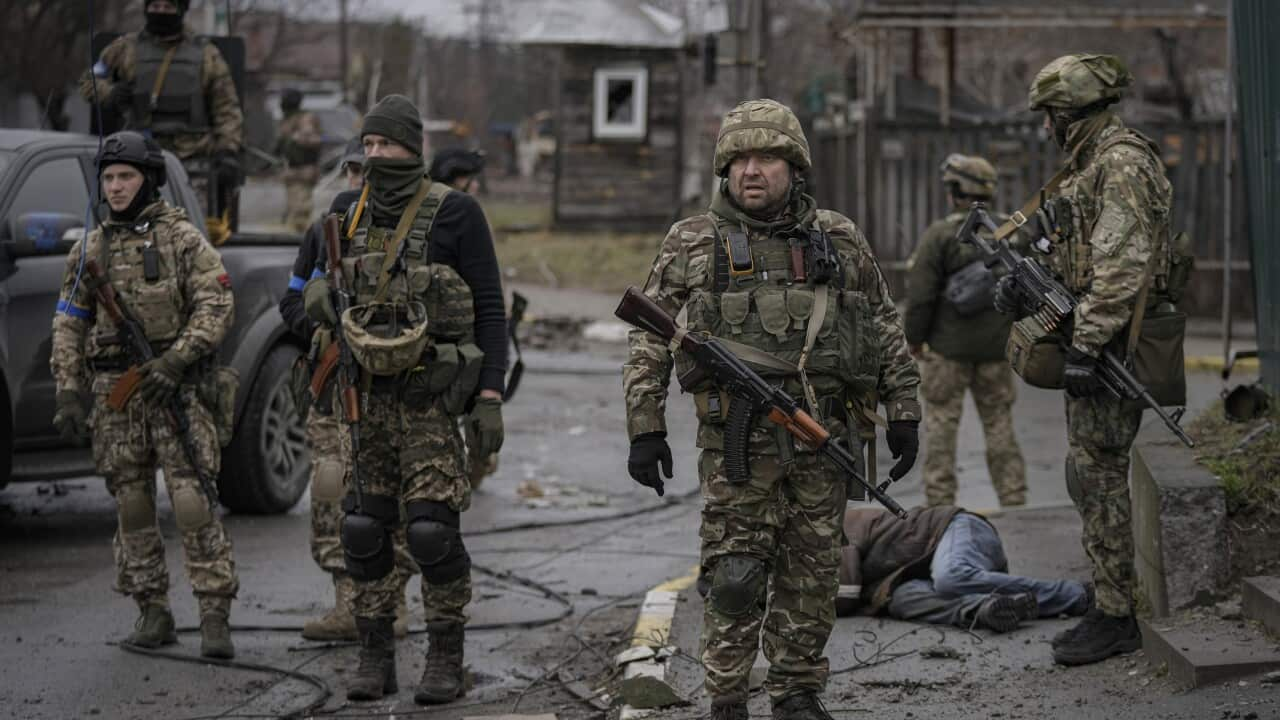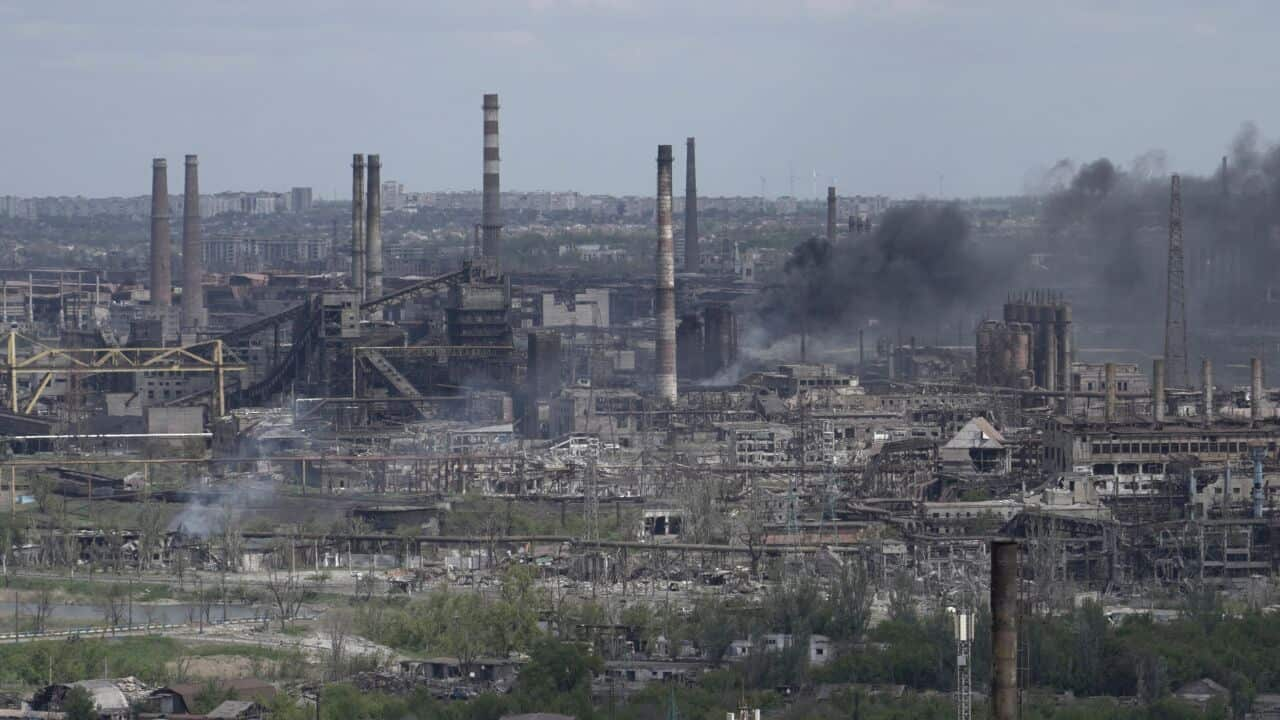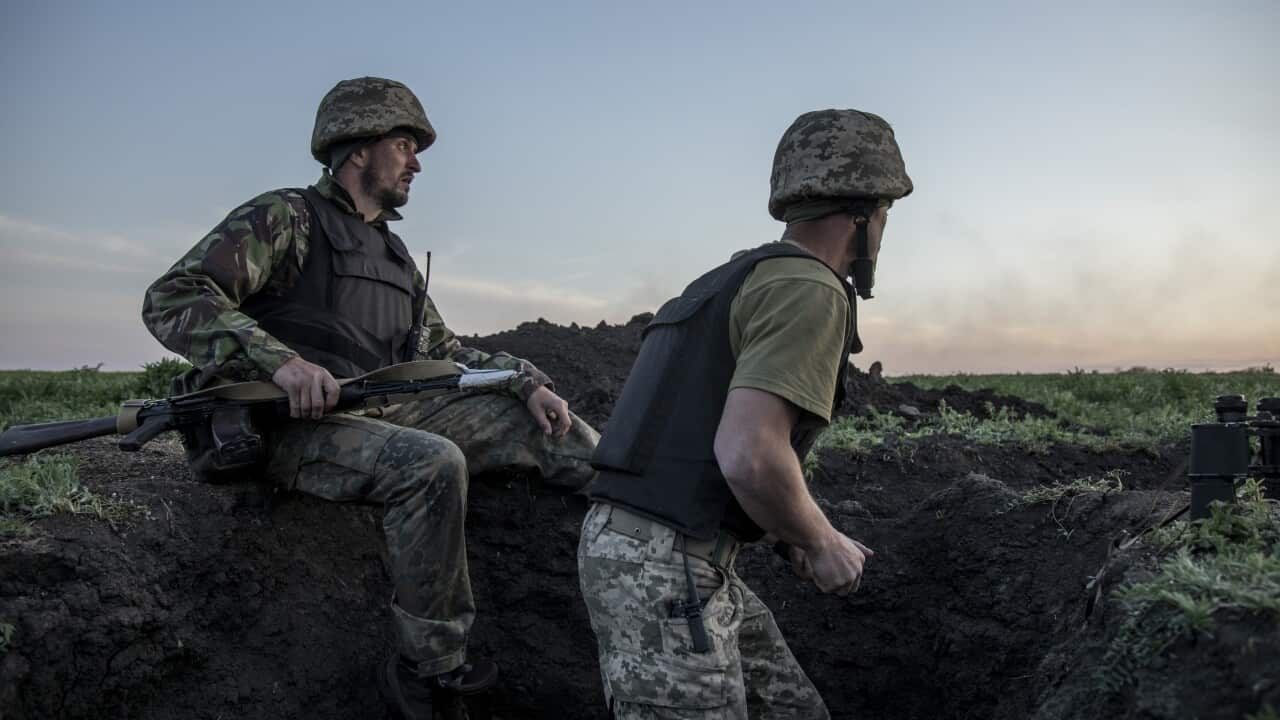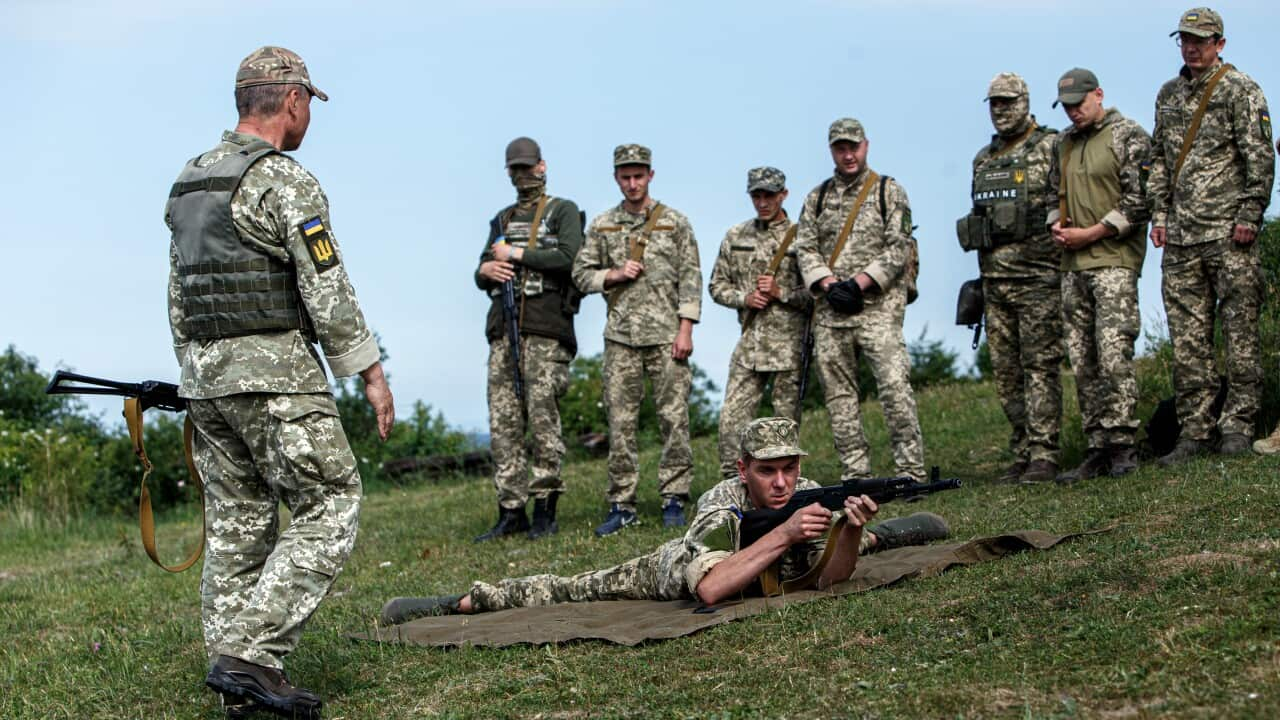Key Points
- Early on 24 February 2022, Russian President Vladimir Putin announced a "special military operation" in Ukraine.
- Here's what has happened since, and what experts say might be next.
Some 100 days ago, the world witnessed the biggest attack by one state against another in Europe since the Second World War.
Early morning on 24 February, . It was a moment Western nations had feared after demanding Russia withdraw the massive military presence it had massed over months .
Mr Putin said the purpose of this was to demilitarise Ukraine and rid it of nationalists threatening Russian speakers there, which Ukraine and its allies said was a baseless pretext for a war of aggression.
It also came against the backdrop of Mr Putin's anger over Ukraine's ambitions to join made up of 30 states from Europe and North America.
Since the first missiles rained down on Ukraine, the country has been devastated. Cities have been decimated, thousands of people have died, and millions of others have fled, with peace talks between Russian and Ukrainian delegations failing to yield any major breakthroughs.
There have also been . In the town of Bucha, Russian forces were and leaving bodies in mass graves and on the streets.
Russia denied the accusations and said Ukraine staged footage of corpses.
It's not a new war though, but rather an escalation of one that began in 2014 when Russia annexed Crimea in southern Ukraine.
"Since 2014, Russia has been waging what's known as a hybrid war against Ukraine. A war that has several components," said Dr Sonia Mycak, a research fellow at the ANU Centre for European Studies.
"There have been three elements. The first is military incursions, such as we're seeing now. The second is cyber attacks on Ukrainian institutions; on banks, on businesses, on government agencies. And thirdly, a systematic campaign of disinformation, of propaganda.
"The full-scale invasion that was launched ruthlessly on 24 February was actually a further, not a first, invasion."
Western nations have ruled out directly helping Ukraine in its fight but have provided assistance. The United States has sent billions of dollars of heavy weapons, while the UK has sent thousands of anti-tank missiles, along with air defence systems, munitions and explosives.
Australia has also supported Ukraine including , on top of tens of millions of dollars worth of humanitarian assistance.
Meanwhile, making it increasingly isolated from the world. These include, among other measures, oil gas import bans, asset freezes, and flight bans.
Russian , and more than 1,000 international businesses have withdrawn or suspended operations in the country , Coca-Cola, and Netflix.
The moves have drawn the ire of Russia, which has responded with its own sanctions and has hit some European nations on which they are heavily dependent.
So, what else has happened?
How many people have died?
It's difficult to put an exact number on how many lives have been lost on both sides.
In Ukraine, more than 4,100 civilians have been killed as of 1 June, according to the Office of the UN High Commissioner for Human Rights (OHCHR).
But it stresses the actual figure is likely to be higher due to delayed toll reporting from areas where intense fighting has been raging and the time it takes to corroborate reports it receives.
In mid-April, Ukrainian President Volodymyr Zelenskyy said up to 3,000 of the country's troops had been killed since the invasion was launched. Around the same time, US intelligence estimated the figure was between 5,500 and 11,000.
Mr Zelenskyy recently told American news channel Newsmax that Ukraine estimated between 60 to 100 of its troops were being killed each day - a figure a Western official reportedly said was "pretty credible".
Russia has not released casualty figures since 25 March, when it said 1,351 of its troops had been killed.
Ukraine's army says more than 30,500 Russian troops have been killed, but this has not been verified. Western intelligence agencies have placed this death toll somewhere between 7,000 and 15,000.
How many people have fled?
The past 100 days since Russia's invasion has seen a "huge humanitarian situation" erupt, said Shabia Mantoo, an Australian who is global spokesperson for the United Nations High Commissioner for Refugees (UNHCR).
"It’s been very brutal on civilians, they’re paying a very heavy price for the situation inside the country," she said.
"There has been massive devastation in urban centres, destruction of civilian infrastructure, so it’s made life for civilians unbearable, and it’s really affected all areas in their lives."
Before the invasion, Ukraine was estimated to have a population of about 41.1 million.
As of 1 June, more than 6.98 million refugees - about 17 per cent of the population - have now fled, according to the UNHCR estimate, in what the agency has labelled "the largest human displacement crisis in the world today."
"This is a really devastating situation for millions of people and still remains quite fragile," Ms Mantoo said, adding humanitarian needs are "rising exponentially".
"In the absence of peace, we are seeing humanitarian needs accrue, but more and more people having to flee their homes."

As of 1 June, more than 6.98 million refugees have fled Ukraine, according to the UNHCR. Source: SBS News
More than 971,000 Ukrainians have also entered Russia, according to the UNHCR. Some have travelled from Luhansk and Donetsk, the pro-Russia separatist regions in Ukraine's east.
Mr Putin says his forces helped evacuate 140,000 civilians from the city of Mariupol (which it has now seized) but insists no one was forced to go to Russia. However Kyiv said some were deported by force, in what would constitute a war crime.
Local Russian volunteer groups say they've helped hundreds travel to other countries.
And at least 2.9 million Ukrainian refugees who fled to neighbouring countries have now moved on to other European nations, according to the UNHCR.
The Department of Home Affairs says more than 6,000 temporary visas have been granted to Ukrainian nationals in Ukraine since the invasion began, and hundreds more to those elsewhere. By early April, more than 1,700 of these visa holders had arrived.
Temporary humanitarian visas (subclass 786), which would allow holders to work, study and access Medicare for three years, have also .
What victories has Ukraine had?
Russia had hoped its forces would be able to storm and capture Ukraine's capital, Kyiv, quickly, but they were met with stiff resistance.
For several weeks, . It's widely believed that this was due to poor planning, underestimating the resolve of Ukraine's forces, and low morale among its own forces.
In the wake of this, Mr Putin announced in late March a new phase of Russia's invasion.
Military activities around Kyiv and the northern city of Chernihiv would be scaled back, and Russia would instead turn its attention to the "liberation" of the mostly Russian-speaking Donbas region in the east where the Moscow-backed rebel regions of Donetsk and Luhansk are situated.
William Partlett, an associate professor at the Melbourne Law School, said maintaining hold of the capital is one of Ukraine's greatest victories.
Mr Partlett said another was Ukraine's forces having successfully prevented Russian troops from seizing the south-west port city of Odesa which has "huge strategic importance".
Seizing this would have allowed Russia to establish a land bridge into "Russian-leaning" Transnistria, he said.
Transnistria is a narrow strip of land between western Ukraine and Moldova. It broke away from Moldova after the fall of the Soviet Union in 1990, but is not recognised internationally as a republic.
"There was some talk among Russian military that there was an objective to try and unify... that they would unify eastern Ukraine, southern Ukraine would be annexed and that would be pushed all the way into parts of Moldova," Mr Partlett said.

President of Ukraine Volodymyr Zelenskyy is pictured during his regular address to the nation, Kyiv, capital of Ukraine on 11 March, 2022. Source: AAP / Ukrinform/ABACA/PA
What victories has Russia had?
In late May, more than 250 Ukrainian fighters .
After weeks of desperate resistance, it brought to an end the most devastating siege of the war, allowing Mr Putin to claim a rare victory. Ukraine believes under weeks of Russian bombardment that left the city in ruins.
Mr Partlett said control of Mariupol was both a strategic and possibly a propaganda victory for Russia. Strategically, it links Russian-controlled land in the eastern Donbas region to Crimea in the south.
"Mariupol was that last little spot that was blocking that. That's really significant," he said. "Prior to this invasion on 24 February, they had to build a bridge to get to Crimea, because they didn't have actual land access. So now they have that."
At the core of the Mariupol siege was the Azov Regiment - whose fighters are admired as "heroes" in Ukraine but accused by the Kremlin of being "neo-Nazis,", which it denies.
The Azov Regiment began as one of many militias of volunteer fighters who came together to fight pro-Russian separatists in eastern Ukraine in 2014. That year, it was folded into Ukraine's National Guard - a military wing of the interior ministry. It had a permanent base in Mariupol until the 2022 invasion.
"It (Mariupol) could also potentially be a big propaganda victory if some of these captured soldiers are then able to be turned into a show trial," Mr Partlett said, adding it would be "largely staged".
Mr Partlett also pointed to Russian forces "slowly" gaining ground in Luhansk and Donetsk, the pro-Russia separatist regions in Ukraine's east.
In recent days, Russian forces have tightened their grip on the industrial city of Sievierodonetsk as part of their drive to control the Donbas.
Backed by heavy artillery, they control most of the city - now largely in ruins - after days of fierce fighting in which they have taken losses, Britain's defence ministry said in its daily intelligence report on Thursday.
If Russia fully captures Sievierodonetsk and its smaller twin Lysychansk on the west bank of the Siverskyi Donets river, it would hold all of Luhansk.
"It looks like they're trying to push to the administrative borders of these two regions - and they are making some head way," Mr Partlett said.
He said this would allow Mr Putin and the Russian government to declare some form of victory - after largely facing defeat - and potentially see them begin the process of annexation.
"They push to these administrative borders, and then it's clear where they're going to annex," he said."But they need to capture that land first before they can do that process."

Russian President Vladimir Putin.
What’s next?
The last known face-to-face peace negotiations between Russia and Ukraine were on 29 March, according to Reuters. Officials said contacts had continued remotely but both sides said on 17 May that the talks had stagnated.
Mr Partlett said while it appeared there were early negotiations taking place, "as far as I can see, nothing has happened".
"It doesn’t seem that, unless something major happens, that there is going to be much momentum to really end it, through some sort of agreement between Ukraine and Russia, and the Western community as well," he said.
Mr Partlett said he views any peace agreement from the Ukrainian side as "doable" - subject to guarantees from Western powers such as Germany, the United States, the United Kingdom and others that Ukrainian security would be guaranteed.
But he said both Mr Zelenskyy and Mr Putin would be constrained, with the Ukrainian leader stating any peace agreement would have to pass a referendum.
"He's constrained by public opinion. And of course, Putin can't completely back away because... he then obviously loses face in front of his own elite, and the Russian people."
Mr Partlett said that territory appears to be a "non-negotiable" sticking point.
"I think where we're going to see talks really struggle is Russia is going to want to annex territory. And I don't think that Ukraine will concede to that - at least at the moment, that doesn’t look likely.
"If that's the case … this war is going to continue for months and months."
Dr Mycak agrees that "the conflict isn't going to end anytime soon".
"The problem now is, I think, Russia is wanting a long, protracted battle. It's wanting to, first of all, wear down Ukrainian forces and it's hoping - Putin is hoping - to outlast the support from the West," she said.
"I think the decisive time is now, and the decisive factor is whether the US, the UK, countries in Europe, whether they actually provide the heavy weaponry that Ukraine has been asking for, and Ukraine needs, to shift the balance - to shift what has kind of been a stalemate.
"I think the only thing that will stop Mr Putin is a military defeat."
Dr Mycak said she believes the Russian leader is not interested in negotiation.
"I don't see Putin as being seriously interested in any kind of compromise. He will not stop until he gets what he wants, which is to take control of Ukrainian land."
With additional reporting by Reuters.

